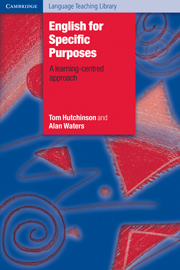Appendix: resources
Published online by Cambridge University Press: 03 May 2010
Summary
Books
At the current time there is a general lack of books on ESP. This is changing and the next few years are likely to see more works published on the subject. Most of the resources of information available are, therefore, in the form of journals or collections of articles.
a) Of the few books currently available ESP in Perspective – A Practical Guide by Jo McDonough (Collins, 1984) gives a good general survey of the field.
b) Another recent book is English for specific purposes by Chris Kennedy and Rod Bolitho (Macmillan, 1984). This book gives a generally language-centred view of ESP.
c) Although not limited to ESP, Henry Widdowson's Teaching Language as Communication (OUP, 1978) is a very useful introduction to the nature of language as communication and approaches to treatment of the four skills. Of great value to practitioners of EST in particular, but also to anyone involved in any area of ESP, are Sections One, Two and Three of the same author's Explorations in Applied Linguistics (OUP, 1979). Many other parts of this book are also highly recommended e.g. chapters 12, 13, 14, 19 and 20. Widdowson's more recent Learning Purpose and Language Use (OUP, 1983) provides a theoretical framework for ESP, and explores some of its practical implications – another ‘must’ for the ESP devotee!
d) The discourse analysis approach to ESP is fully explained in English for Science and Technology: A discourse approach by Louis Trimble (CUP, 1985).
- Type
- Chapter
- Information
- English for Specific Purposes , pp. 170 - 173Publisher: Cambridge University PressPrint publication year: 1987



